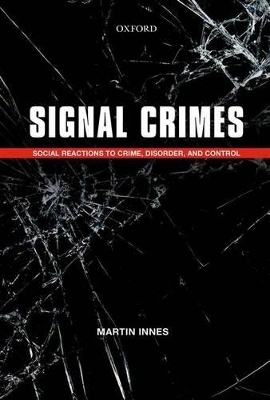
Signal Crimes
Oxford University Press (Verlag)
978-0-19-968447-2 (ISBN)
How do individuals, communities, and institutions react to crime, disorder, and social control events? How do such incidents shape the contours of social order and the make-up of society? Why do some crimes and disorders matter more than others in influencing how we think, feel, and act about our security? These are the questions that lie at the heart of Signal Crimes: Social Reactions to Crime, Disorder, and Control.
Signal Crimes: Social Reactions to Crime, Disorder, and Signal Crimes brings together the key insights and findings from a ten-year programme of fieldwork investigating the concept of a 'signal crime': an incident that changes how people think, feel and behave about their safety due to it functioning as a signal of the presence of wider risks and threats.
Presenting ground-breaking new perspectives on social reactions to crime, Signal Crimes innovatively and rigorously examines how and why particular events trigger certain forms of reaction, and how these unfold and develop across social space and time. This includes detailed studies of: how fear travels within and across communities in the aftermath of criminal homicides; the ways rumours impact upon what we think about the prevalence and distribution of crime; the extent to which some individuals and neighbourhoods are vulnerable to being harmed more by disorder than others; how the conduct of counter-terrorism has been altered in recent years by the institutional effects of a number of signal events; and the ways in which social control interventions are used to communicate messages to public audiences.
Through examination of these diverse issues and using a range of both historical and contemporary sources, the author reveals how our individual and collective responses to problematic behaviour are organised. If a perspective constitutes a way of seeing, then the signal crimes perspective provides a new set of optics for how we see the impacts of crime, disorder, and control. Showcasing the development of this new concept, Signal Crimes argues for a radical and challenging understanding of how we think not only about the crime, but also about the ways in which we perceive and react to such problematic and troubling acts.
Martin Innes is Professor in the School of Social Sciences at Cardiff University where he leads the work of the Universities' Police Science Institute. He is recognised as one of the world's leading thinkers on policing and social control. Author of two previous books Investigating Murder (Oxford) and Understanding Social Control (Open University Press), from 2004-14 he was Editor of the journal Policing and Society, and he has been a contributor to the Guardian and Prospect Magazine. His work on signal crimes was one of the key influences upon the development of Neighbourhood Policing in the UK, and has led to him being regularly asked to advise policing agencies and governments around the world, including in the US, Australia, Canada and Holland.
1. A Signal Crimes Perspective ; 2. Why Disorder Matters: Reading Urban Situations ; 3. How Fear Travels: The Private, Parochial, and Public Harm Footprints of Criminal Homicides ; 4. The Crimes That Were Not There: 'Soft Facts' and the Causes and Consequences of Crime Rumours ; 5. The Long Shadow of the Twin Towers and the 'New' Counter-terrorism: A Case Study of the Institutional Effects of Signal Crimes ; 6. Control Signals ; An Afterword on Method: 'Gonzo Research' and the Uses of Systematic and Unsystematic Social Observation
| Verlagsort | Oxford |
|---|---|
| Sprache | englisch |
| Maße | 166 x 234 mm |
| Gewicht | 346 g |
| Themenwelt | Recht / Steuern ► EU / Internationales Recht |
| Recht / Steuern ► Strafrecht ► Kriminologie | |
| Recht / Steuern ► Strafrecht ► Strafverfahrensrecht | |
| Sozialwissenschaften ► Soziologie | |
| ISBN-10 | 0-19-968447-2 / 0199684472 |
| ISBN-13 | 978-0-19-968447-2 / 9780199684472 |
| Zustand | Neuware |
| Haben Sie eine Frage zum Produkt? |
aus dem Bereich


